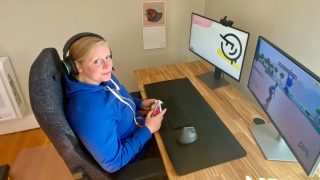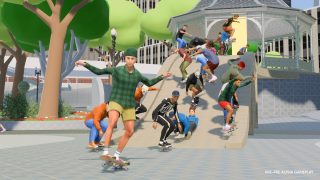Creating a Culture of Connection as a Remote Studio
Full Circle’s Head of Operations, Kristin Street, shares how people-centered processes can empower a strong studio culture.

What does culture mean to you? From the hallways of global corporations to behind the counter of your local coffee shop, conversations about culture in the workplace are happening everywhere. Workplace culture matters, but what it means often differs from one person to the next. At Full Circle, crafting a strong studio culture has been a priority since day one, with the many voices of its team creating something greater than the sum of its parts.
Despite being a relatively new studio, Full Circle already sits on a strong foundation when it comes to culture. By the time the studio turned two, it was the proud recipient of back-to-back GamesIndustry.biz Best Places to Work Awards, a competition largely based on the feedback of its team. When Kristin Street joined the studio as Full Circle’s Head of Operations earlier this year, she made it her mission to take that foundation and build upon it, putting people first in her approach to the processes, strategies and systems operations is so known for.
“At its core, operations is about making it easier for people to do their jobs,” Kristin explains. “There needs to be such a people-focus; if you’re not making life easier for your team, you’re not succeeding at your job.”
Of course, in practice, this simple statement gets a lot more complex. For one thing, Full Circle is EA’s first fully remote studio, with a team spanning countries, continents and time zones. But, what some would see as a potential operational nightmare, Kristin sees as an opportunity.
“We make games. Virtual spaces where people not only connect, they create thriving communities that have nothing to do with proximity” she says. “Being a remote studio definitely comes with its own unique challenges, but it also presents the opportunity to build a dynamic, diverse and inclusive community that reflects the very people we make games for. By connecting in a virtual environment, in a way we’re coming closer to the player experience than ever before.”

While the studio may be geographically dispersed, its values serve as common ground. “Our values are where everything kind of starts and stops; they’re a part of our DNA,” Kristin says. “How we do our work is as important as the work that we do.”
While talking about values is one thing, living them is another - and this is where culture and operations intersect. Kristin is the first to admit that developing a game on time and on budget is a lot of hard work, but, with the help of some value-empowered processes, systems and strategies, it should also be fun. “It can be really hard to find the right balance,” she says. “But, I think when operations is done right, that’s what it creates - more time, more space, and more opportunities for creativity, innovation, beauty, and for fun.”
So, what does bringing these values to life look like in practice?
For one thing, a strong commitment to diversity, equity, and inclusion goes hand-in-hand with culture at Full Circle. In a classic case of life imitating art, the studio’s approach is at least partially inspired by the game they’re developing, skate., and the sport behind it. “Over the years, skateboarding has become incredibly diverse, in part because the barrier for entry is so low,” Kristin says. “We try to take that same principle and apply it to our studio, eliminating barriers wherever we see them.”
The parallels don’t stop there. The freedom of expression, drive to push the limits, respect for peers and even the laid-back signature style so associated with skateboarding could all just as easily be used to describe Full Circle and its approach to game development.

Internal playtests allow the team to connect the same way players do - in the game.
For Kristin, it all boils down to one thing. “To me, culture is all about creating safety,” she says. “The safety to have open and honest dialogue, to live and work as your authentic self, and the safety that comes with knowing you can trust your team to have systems and processes in place to support you if you need it.”
How the studio communicates to its team plays a big part in building that trust. Fans of skate. won’t be surprised that transparency is talked about a lot at the studio. The level of transparency shown to players through showcasing pre-pre-pre alpha gameplay is just as apparent in Full Circle’s approach to communicating with its team, and is reinforced in the many town halls, AMAs, Q&As, and virtual gatherings the studio holds.
But, communication alone doesn’t equal connection, especially when it’s done through a screen. “Virtual communication can feel a bit transactional at times,” Kristin says. “It takes intention and effort to create space for informal interactions that allow team members to connect on a more personal level.”
Kristin credits Full Circle’s Culture Committee and its Studio Culture and Engagement Specialist as having a big impact in this area, as well as the team overall for making connection a priority. From weekly Friday hangouts and internal playtests to milestone celebrations, chat clubs and peer-to-peer “Awesomeness Awards,” there is no shortage of opportunities for the team to get to know each other on a deeper level.
While physically being apart certainly paints a new picture of what culture looks like, Kristin would argue it’s far from impossible to cultivate connections that transcend these boundaries. “This may be controversial, but I don’t think it’s actually any easier to build culture in an in-person studio,” she says. “The challenges may be a little different, and how we approach them certainly has to be different, but the fundamentals are the same. There are no quick fixes. Building a strong sense of culture takes time, it takes commitment, and it takes intention. Above all, it requires those in leadership to understand the needs of their team and how to best support them, whether they’re in the next cubicle or country.”
